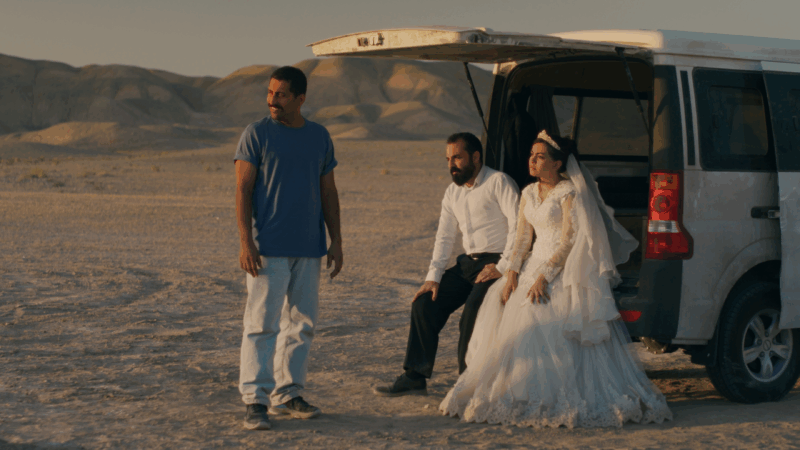‘It Was Just an Accident’ is a blast of pure anti-authoritarian rage
When the Iranian director Jafar Panahi showed up at the Cannes Film Festival earlier this year, it struck some of us as something close to a miracle. For most of the past 15 years, since he was arrested in 2010 and charged with making anti-government propaganda, Panahi had been forbidden to travel outside Iran. He’d also been banned from making movies, though he got around that restriction with great ingenuity and continued to shoot films in secret.
But then, in 2022, Panahi was arrested again and imprisoned. When he announced, seven months later, that he was beginning a hunger strike, many of us feared it would end with his death. Instead, he was released after two days and has been free to travel ever since.
It’s an astonishing real-life story, one that, for tension and peril, may well rival the one that Panahi tells in his new film, It Was Just an Accident. This remarkable movie, which ended up winning the Palme d’Or at Cannes, feels like a liberated work in every sense.
In his recent, more under-the-radar films, like 3 Faces or No Bears, Panahi sometimes seemed to be speaking in code, or through layers of parable. But there’s nothing cryptic or ruminative about It Was Just an Accident. It’s a blast of pure anti-authoritarian rage, a gripping and often shockingly funny revenge thriller that, as Panahi has said in interviews, was informed by the stories of people he met in prison.
It begins on a dark night, when an auto mechanic named Vahid (played by Vahid Mobasseri) hears something in his shop that catches his attention. It’s the sound of a customer’s prosthetic leg, clomping slowly along, and it clearly triggers painful memories.
Some time ago, Vahid was one of several people arrested while protesting for workers’ rights. In prison, they were brutally tortured by a man they came to know as Peg Leg, because of his prosthetic. Now, Vahid could swear that the customer in his garage, whose name is Eghbal, is Peg Leg himself. But since Vahid was blindfolded during his torture, he can’t trust his eyes, only his ears.
What Vahid does next is shocking: The following day, after tailing Eghbal for a while in his van, Vahid knocks the man out with a shovel, ties him up, transports him to a remote area, and tries to bury him alive. But Eghbal regains consciousness and begs Vahid to stop, claiming that he isn’t the culprit and has no idea what Vahid is talking about.
Vahid puts Eghbal back in his van and drives off to find others who can verify the man’s identity. One of his fellow former prisoners is a photographer named Shiva, played by Maryam Afshari, who, when he finds her, is in the middle of taking a couple’s pre-wedding photos. The bride, who’s dressed in her full white gown, turns out to be one of Peg Leg’s victims, too.
Before long, Vahid’s van has picked up so many passengers that it starts to resemble a clown car, or maybe the yellow Volkswagen van from Little Miss Sunshine. Most of those passengers want Eghbal dead, but none of them can be 100% certain he’s the guilty party, and they bicker relentlessly about what to do next.
As deadly serious as everything is, Panahi pushes the action and the banter to often-farcical extremes; he’s made a road movie in which the characters keep going around and around in circles. It’s startling just how funny It Was Just an Accident can be; it’s attuned to the comic futility as well as the horror of the situation. There’s an especially dry running gag in which Vahid finds himself forced to bribe various people, from security guards to hospital nurses — a jab at the banal everyday corruption of life under an oppressive system.
As day bleeds into night, It Was Just an Accident builds to a dramatic climax of lacerating emotional force — a sequence so intense, you can practically feel Panahi’s rage burning a hole through the screen.
As day bleeds into night, It Was Just an Accident builds to a dramatic climax of lacerating emotional force — a sequence so intense, you can practically feel Panahi’s rage burning a hole through the screen. His movie, in weighing the question of revenge vs. mercy, is an obvious warning to authoritarian regimes everywhere.
But it also feels like a warning to people living under those regimes. Several weeks ago, I moderated a Q&A with Panahi in Los Angeles, a city he hadn’t visited in almost 20 years. While we were talking before the Q&A, Panahi turned to me with a grave look on his face and said, “I’m worried about your country.”
Pakistan claims to have killed at least 70 militants in strikes along Afghan border
Pakistan's military killed at least 70 militants in strikes along the border with Afghanistan early Sunday, the deputy interior minister said.
Team USA faces tough Canadian squad in Olympic gold medal hockey game
In the first Olympics with stars of the NHL competing in over a decade, a talent-packed Team USA faces a tough test against Canada.
PHOTOS: Your car has a lot to say about who you are
Photographer Martin Roemer visited 22 countries — from the U.S. to Senegal to India — to show how our identities are connected to our mode of transportation.
Looking for life purpose? Start with building social ties
Research shows that having a sense of purpose can lower stress levels and boost our mental health. Finding meaning may not have to be an ambitious project.
Sunday Puzzle: TransformeR
NPR's Ayesha Rascoe plays the puzzle with listener Joan Suits and Weekend Edition Puzzlemaster Will Shortz.
Danish military evacuates US submariner who needed urgent medical care off Greenland
Denmark's military says its arctic command forces evacuated a crew member of a U.S. submarine off the coast of Greenland for urgent medical treatment.






